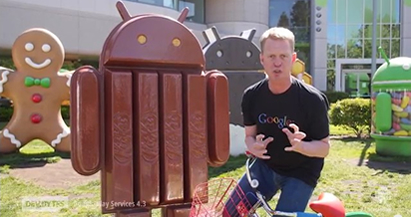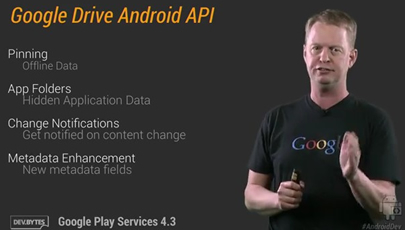Google Play game services, the engine that drives online features for many Android games, is expanding even more to iOS. In an announcement coinciding with the Game Developers Conference this week, Google says it’s adding turn-based and real-time cross-platform multiplayer capabilities, which enables Android and iOS players to play against each other.
 Google already supports iOS through a Unity game engine plugin that supports achievements and leaderboards, and this will be updated with multiplayer capability. Google is also releasing an early-version SDK for non-Unity games, but it won’t support multiplayer gaming yet at launch.
Google already supports iOS through a Unity game engine plugin that supports achievements and leaderboards, and this will be updated with multiplayer capability. Google is also releasing an early-version SDK for non-Unity games, but it won’t support multiplayer gaming yet at launch.
Google Play services 4.3 improves on its existing APIs, and also adds new APIs: Google Analytics API, Tag Manager, and the Address API. Let’s check them out below, as described by Google:
Google Analytics and Google Tag Manager
The Analytics API and Google Tag Manager have existed for Android for some time as standalone technologies, but with this release, Google is incorporating them as first class citizens in Google Play services. If you are used to the API, you’ll find it very similar to previous versions.
Google Analytics gives you detailed statistics on how your app is being used by your users — for example what functionality of your app is being used the most, or which activity triggers users to convert from an advertised version of an app to paid one. Google Tag Manager also lets you change characteristics of your app on-the-fly — for example colors — without having to push an update from Google Play.
Google Play Games services update
With this release, Google is introducing game gifts, which allows players to send virtual in-game requests to anyone in their Google+ circles or through player search. Using this feature, the player can send a ‘wish’ request to ask another player for an in-game item or benefit, or a ‘gift’ request to grant an item or to benefit another player.
 Drive API
Drive API
The newly added Google Drive for Android API has been updated with the ability to access several new metadata fields, and the API now includes three major new features:
Pinning – You can now pin files that should be kept up to date locally, ensuring that the files are available when the user is offline. This is useful for users that need to use your app with limited or no connectivity.
App Folders – An app often needs to create files which are not visible to the user — for example to store temporary files in a photo editor. This can now be done using App Folders, a feature similar to Application Data Folders in the Google Drive API.
Change Notifications – You can now register a callback to receive notifications when a file or folder is changed. This mean you no longer need to query Drive continuously to check if the data has changed; just add a change notification to it.
Address API
Google Play services 4.3 also includes a new Address API, which enables developers to request access to addresses — for example to auto-fill in a delivery address form. In the user interface, the user can select a previously filled out address, and the entire form is automatically filled out. This non-location based alternative can be helpful to users who might want to use a different address than their current physical location.
You can check out the somewhat entertaining Google Play services 4.3 release video here, or watch below:




